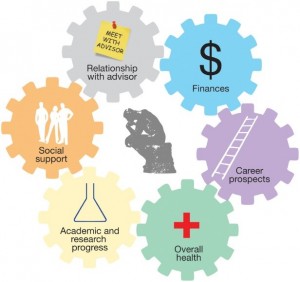You have ideas what you are passionate about, and you have spent years cultivating expertise. Now, how do you get your voice heard? How can you work to advance the issues? How can you influence change?
In mid-April, the Office of Postdoc Affairs co-hosted a workshop from the OpEd Project, a national effort to diversify the voices we hear in public conversations. The facilitator Michele Weldon has 3 decades as a public thought leader through her books, articles, and media work. Certain key points stood out from the workshop:
- Own your expertise. You are an expert in _____ because ______. What are you a go-to person for? On what basis do you have credibility in this area? Own it, even if it feels there are others around you who are more established, more credentialed, more famous. We need YOUR voice and perspective in the world for real impact to occur.
- Personal promotion isn’t self-serving (only), it is working toward public service. That is, you aren’t just “tooting your own horn” when you say your voice matters, you are bringing attention to issues that are critical to you. The bigger your sphere of influence the greater impact for change you can have. Reframe your approach to self-promoting activities like tweeting, blogging, writing pieces for public audiences/radio spots to building your sphere of influence for issues you care about. And, as a result, you distinguish yourself in what may be a crowded field.
- “If you say things of consequence, there will be consequences. But the risk and alternative is to be inconsequential.” (OpEd Project saying) Anticipate nay-sayers. As you practice your response to those who will say “who cares” and “why you”, you can be ready to stand your ground with calm, clear and respectful confidence. Sometimes these doubting voices come from within our own heads. Practice saying the same calm, confident response back when that voice of self-doubt or imposter syndrome rises up. #OwnIt
- Make a pitch to an editor. Craft a tight 4-5 sentence email that showcases the following: So what? Why you? Why now? What’s the contribution? Why this outlet? And then sign it with your full name and affiliations. Then cut/paste your 600-800 essay right below that (no attachments). Editors are busy and they want to scan what you have, not take an extra step to ask for it. You can use a descriptive email subject line: Timely commentary on ______.
We know that peer reviewed publications are still the coin of the realm as far as your own academic career goes. But how do you get people to read your peer reviewed publications? How can they make the kind of impact you’d like? Amplify your work by pairing peer-reviewed publications with pieces you write for the public conversation or using social media to get your work in front of more people in your professional networks. Many postdocs have created their own professional websites to gather together examples of their research and engagement activities, to reflect more of who they are. Websites, coupled with social media, can expand your reach and help you stand out from others in a job search or otherwise crowded space. See Future of Ice Initiative postdoc Sarah Myhre’s website as a terrific example of this, and check out how she features both peer reviewed research and news media highlights. Have a good example of your own? Send it to us, we want to feature it in an upcoming newsletter!
Write to Change the World.
Additional Resources:
- Vitae Blog – Writing for the Public for Academics
- Sage Publications – Tips for Scholars Writing an Op-Ed
- American Sociology Association – Tips for communicating with policymakers and the media
- COMPASS: The COMPASS vision is to see more scientists engage, and engage effectively, in the public discourse about the environment.
- Looking for a public forum for your work? Check out: aeon.co
- Contexts Magazine – A quarterly magazine that makes cutting-edge social research accessible to general audiences – the public face of sociology.
- American Education Research Association – Examples of public scholarship
Originally posted on April 21, 2016.
